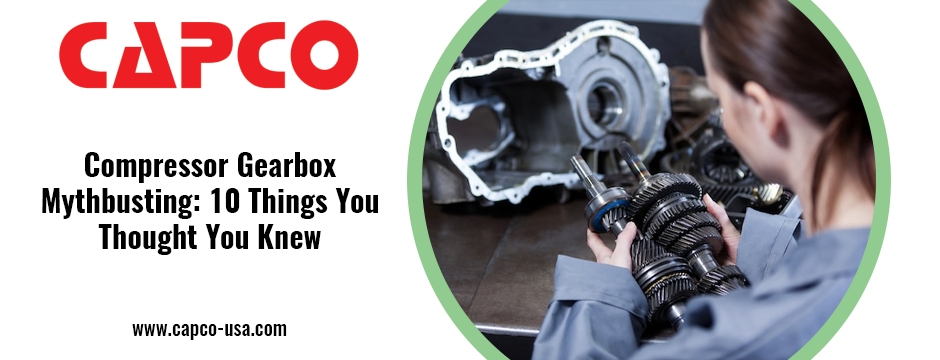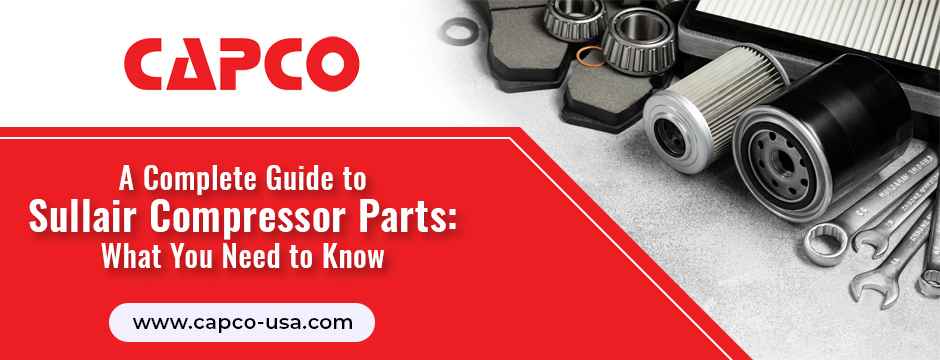The compressor gearbox is a critical component of many industrial machines. It enables the efficient transfer of energy created by the motor into the compressor. Many myths and misconceptions have developed over the years around the operation of the compressor gearboxes, and how they should be maintained, as well as the cause of the failure of the gearbox. These myths result in poor decisions, lost time and money, and perhaps, life diminishing machinery malfunctions.
Let’s break down 10 common myths about compressor gearboxes—and uncover what the truth really is.
Myth 1: All Gearboxes Are Essentially the Same
Reality:
Gearboxes are not a quality control product. Gearboxes are produced for specific machines, load conditions, and environments. A compressor gearbox has specific thermal, torque, and speed conditions. Using it for something different could lead to a gearbox that fails early, causes inefficient operation, and generates excessive heat!
Tip:
Always choose the gearbox according to the compressor requirement, not shape or size.
Myth 2: Gearboxes Don’t Require Regular Maintenance
Reality:
The best gearboxes require regular checks and maintenance. Some people feel that gearboxes last forever once they’re installed. In fact, without lubrication, gears get misaligned, or debris settles and becomes stuck, which can destroy gears within.
Tip:
Follow a routine maintenance schedule. Oil levels need to be checked, leaks inspected, and odd noises monitored.
Myth 3: Louder Is Stronger
Reality:
Noisy gearbox doesn’t mean it’s working harder, it could mean something is wrong. Excessive noise can be the result of misaligned gears, worn bearings, or insufficient lubrication. If your compressor gearbox gets louder with time, this is a warning sign, not increased power.
Tip:
Don’t neglect new or strange noises. Arrange for a check-up when there is increased noise.
Myth 4: Too Much Grease Is Better Than Too Little Grease
Reality
Too much grease is as bad as too little grease. Over-greasing may damage seals, produce heat, and pressure in the gearbox housing. This can drive the grease away from critical areas.
Tip:
Use the specified quantity and type of lubricant. Check the owner’s guide before greasing.
Myth 5: Synthetic Oils Always Run Better
Reality:
Synthetic oils are not necessarily better for all gearboxes. While they are acceptable to use in hot or heavy-duty operations, some gearboxes are well matched to run with mineral oils. Using the wrong type of oil will shorten the life of the gearbox.
Tip:
Always match the lubricant to the gearbox design and operating conditions.
Myth 6: Small Leaks Can Be Ignored
Reality:
The least amount of oil leakage will prove to be a future headache. This means that the pressure inside is out of balance, or seals are failing. Oil decreasing causes friction to increase, and this destroys the gear teeth.
Tip:
Repair the leak early. A few drops now will mean costly repairs in the future.
Myth 7: Gearbox Failures Happen Without Notice
Reality:
The majority of gearbox failures provide warnings well in advance of actual failure. These include excessive noise, heat, vibration, or even a slight variation in performance. Many people neglect noticing these warning signs, as they are not visually observable or audible.
Tip:
Train your personnel to detect early warning signs. Employ vibration and oil analysis equipment if available.
Myth 8: It Is Always Best to Replace the Entire Gearbox
Reality:
In the wide majority of cases, only a single or dual internal component needs to be replaced. A gearbox rebuild or targeted component replacement can be considerably less expensive than a full replacement. Many industrial grade manufacturers offer high quality Sullair compressor parts that perform just as reliably as factory-original components, helping you restore performance without overspending.
Tip:
Don’t replace the entire unit automatically. You might save time and money on a partial repair with the guidance of a professional.
Myth 9: Greater Gear Ratios Always Result in Improved Efficiency
Reality:
A higher gear ratio alters speed and torque but it will not necessarily improve energy consumption. It can strain the compressor or motor with too low or too high a ratio. Gear ratios must be properly matched to system needs.
Tip:
Identify speed and torque based on your compressor configuration. Avoid chasing numbers without considering the entire system.
Myth 10: Aftermarket Gearboxes Are Low Quality
Reality:
Not all that is aftermarket is cheap and of poor quality. Numerous quality companies produce very good quality aftermarket compressor gearboxes and parts. They are usually at or better than OEM specifications, and they undergo testing for performance and durability.
Tip:
Work with reputable aftermarket vendors. Look for those who offer warranty backed parts and technical support.
Final Thoughts

Compressor gearboxes are high stakes, high tech units. Making decisions based on out of date myths can lead to expensive repairs, wasted energy, and even equipment damage. By learning what actually makes these popular myths tick, plant operators and technicians can make smarter, safer, and more cost-effective choices.
No matter how big or small your workshop or how much your industrial facility processes, knowing your gearbox is the key to maximizing your compressor’s lifespan and performance. Maintenance, oil selection, noise detection, and proper parts usage all have a significant impact.
Don’t rely on myth to track your maintenance. Educate yourself. Be aware.
If you’re looking for quality aftermarket compressor gearbox parts backed by expert support, explore trusted provider CAPCO USA—known for supplying high-performance components across a wide range of compressor systems.



